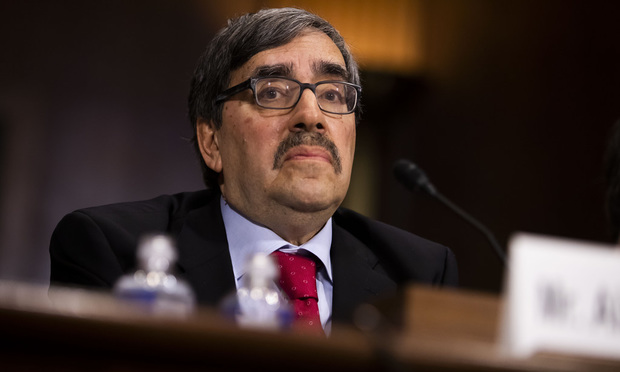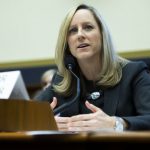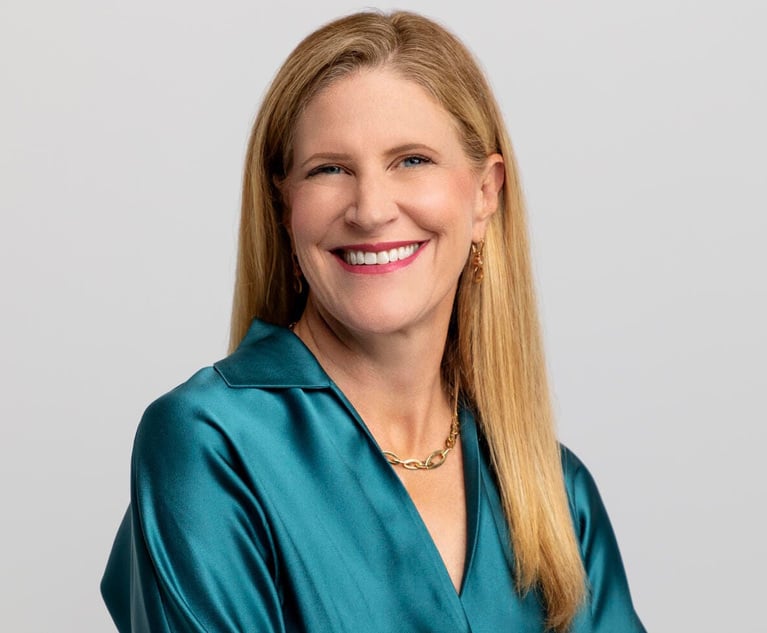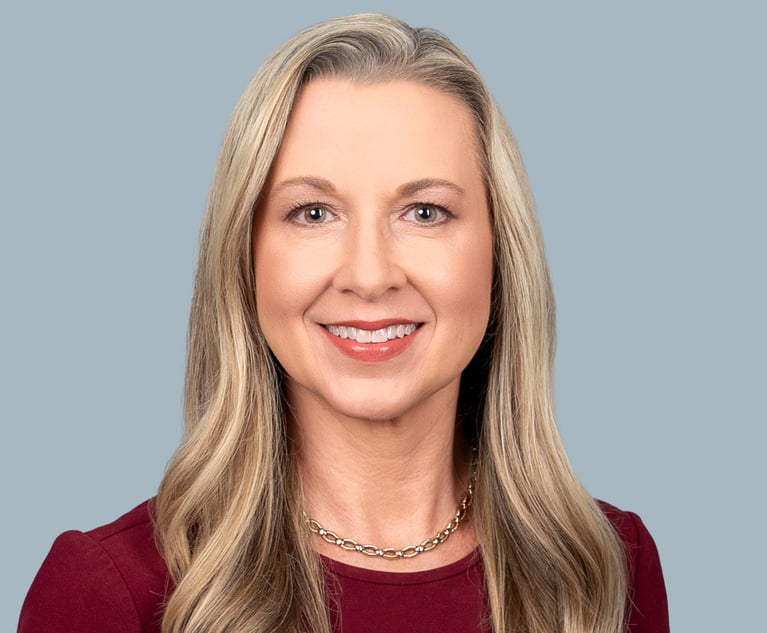Lawyer Says, Contrary to Belief, Consumer Enforcement Is Alive and Well
Co-leader of Ballard Spahr's consumer financial services group said his law firm has not seen any continued drop in the number of investigations under President Donald Trump's administration.
August 21, 2019 at 05:28 PM
4 minute read
 "" diego="" m.="" width="620" height="372" /> Alan Kaplinsky, with Ballard Spahr, testifies before the Senate Judiciary Committee during a hearing titled "Arbitration in America," April 2, 2019. Photo: Diego M. Radzinschi/ALM
"" diego="" m.="" width="620" height="372" /> Alan Kaplinsky, with Ballard Spahr, testifies before the Senate Judiciary Committee during a hearing titled "Arbitration in America," April 2, 2019. Photo: Diego M. Radzinschi/ALM
General counsel should keep on their toes in matters affecting consumers because—contrary to popular belief—regulators are aggressively pursuing consumer complaints on both the federal and state level.
That's the advice from Alan Kaplinsky, co-leader of Ballard Spahr's consumer financial services group. He said his law firm has not seen any continued drop in the number of investigations under President Donald Trump's administration.
State attorneys general and state banking regulators are becoming more active and are filling any enforcement void by the U.S. Consumer Financial Protection Bureau, "if there even is a void," he said.
Kaplinsky said early in the administration a number of bureau investigations were dropped. "But little by little, under [new] director Kathy Kraninger the level of activity has really ramped up."
While the bureau did not immediately respond to requests for comment, a look at its annual and quarterly reports supports Kaplinsky's theory.
In fiscal years 2015, 2016 and 2017 the bureau collected penalties from more than 30 defendants each year, mainly companies. In 2018 that number dropped to 14.
 "" diego="" m.="" width="150" height="150" /> CFPB Director Kathy Kraninger. Photo: Diego M. Radzinschi/ALM
"" diego="" m.="" width="150" height="150" /> CFPB Director Kathy Kraninger. Photo: Diego M. Radzinschi/ALMKraninger became director in December 2018, and the only quarterly report available so far under her command, for January through March, shows the number of defendants increased to seven in that quarter. If the trend continues, enforcement actions for four quarters could near pre-Trump administration levels.
"There's been a slow and steady increase," Kaplinsky noted. "We can see it in the number of consent orders that has increased, and that's the tip of the iceberg. We know there are also a lot of investigations that are not yet public."
Besides the increased federal activity, Kaplinsky said some states, including Pennsylvania, have created what he called "mini-CFPBs." In addition, New Jersey and New York's Departments of Financial Services have "become an even more formidable financial regulator," he said.
The states seem to be more focused now on consumer protection, especially involving what Kaplinsky called "emerging products." For example, he said several states are investigating 12 companies involved in a new financial technology product offering worker pay advances based on each day's pay. For a fee, it allows workers to collect their pay daily and not have to wait on a weekly or biweekly check.
"It's a very innovative product and it's very consumer-friendly," he said. "But apparently various banking regulators don't like it. They say it violates state usury, licensing and labor laws."
He said more enforcement is occurring under new state licensing laws for companies that service student loans, particularly in Massachusetts.
Both state and federal regulators continue to go after third-party debt collectors who abuse consumers, he said. "Debt collection has always been a hot area," Kaplinsky noted.
There is one area, he said, the federal watchdogs appear to have left to the states: fair lending. "That's one area where there's virtually nothing going on at the federal level right now."
He cited Pennsylvania's mortgage redlining probe as an example of heightened state action, along with New York's investigation of financial institutions for allegedly using collected data to target certain markets and exclude people in protected classes.
Kaplinsky said the increased state enforcement coupled with more investigative demands from the CFPB has his clients asking: "What's going on here? We thought they were out of business."
The bottom line, he said, is "There is this perception [of an enforcement void] and there is reality. The reality right now is quite a bit different from the perception."
This content has been archived. It is available through our partners, LexisNexis® and Bloomberg Law.
To view this content, please continue to their sites.
Not a Lexis Subscriber?
Subscribe Now
Not a Bloomberg Law Subscriber?
Subscribe Now
NOT FOR REPRINT
© 2025 ALM Global, LLC, All Rights Reserved. Request academic re-use from www.copyright.com. All other uses, submit a request to [email protected]. For more information visit Asset & Logo Licensing.
You Might Like
View All
Former Capital One Deputy GC Takes Legal Reins of AIG Spinoff

Class Certification, Cash-Sweep Cases Among Securities Litigation Trends to Watch in 2025
6 minute read
Ex-Six Flags CLO Lands New C-Suite Post—This Time as HR Chief

After 2024's Regulatory Tsunami, Financial Services Firms Hope Storm Clouds Break
Trending Stories
Who Got The Work
J. Brugh Lower of Gibbons has entered an appearance for industrial equipment supplier Devco Corporation in a pending trademark infringement lawsuit. The suit, accusing the defendant of selling knock-off Graco products, was filed Dec. 18 in New Jersey District Court by Rivkin Radler on behalf of Graco Inc. and Graco Minnesota. The case, assigned to U.S. District Judge Zahid N. Quraishi, is 3:24-cv-11294, Graco Inc. et al v. Devco Corporation.
Who Got The Work
Rebecca Maller-Stein and Kent A. Yalowitz of Arnold & Porter Kaye Scholer have entered their appearances for Hanaco Venture Capital and its executives, Lior Prosor and David Frankel, in a pending securities lawsuit. The action, filed on Dec. 24 in New York Southern District Court by Zell, Aron & Co. on behalf of Goldeneye Advisors, accuses the defendants of negligently and fraudulently managing the plaintiff's $1 million investment. The case, assigned to U.S. District Judge Vernon S. Broderick, is 1:24-cv-09918, Goldeneye Advisors, LLC v. Hanaco Venture Capital, Ltd. et al.
Who Got The Work
Attorneys from A&O Shearman has stepped in as defense counsel for Toronto-Dominion Bank and other defendants in a pending securities class action. The suit, filed Dec. 11 in New York Southern District Court by Bleichmar Fonti & Auld, accuses the defendants of concealing the bank's 'pervasive' deficiencies in regards to its compliance with the Bank Secrecy Act and the quality of its anti-money laundering controls. The case, assigned to U.S. District Judge Arun Subramanian, is 1:24-cv-09445, Gonzalez v. The Toronto-Dominion Bank et al.
Who Got The Work
Crown Castle International, a Pennsylvania company providing shared communications infrastructure, has turned to Luke D. Wolf of Gordon Rees Scully Mansukhani to fend off a pending breach-of-contract lawsuit. The court action, filed Nov. 25 in Michigan Eastern District Court by Hooper Hathaway PC on behalf of The Town Residences LLC, accuses Crown Castle of failing to transfer approximately $30,000 in utility payments from T-Mobile in breach of a roof-top lease and assignment agreement. The case, assigned to U.S. District Judge Susan K. Declercq, is 2:24-cv-13131, The Town Residences LLC v. T-Mobile US, Inc. et al.
Who Got The Work
Wilfred P. Coronato and Daniel M. Schwartz of McCarter & English have stepped in as defense counsel to Electrolux Home Products Inc. in a pending product liability lawsuit. The court action, filed Nov. 26 in New York Eastern District Court by Poulos Lopiccolo PC and Nagel Rice LLP on behalf of David Stern, alleges that the defendant's refrigerators’ drawers and shelving repeatedly break and fall apart within months after purchase. The case, assigned to U.S. District Judge Joan M. Azrack, is 2:24-cv-08204, Stern v. Electrolux Home Products, Inc.
Featured Firms
Law Offices of Gary Martin Hays & Associates, P.C.
(470) 294-1674
Law Offices of Mark E. Salomone
(857) 444-6468
Smith & Hassler
(713) 739-1250






